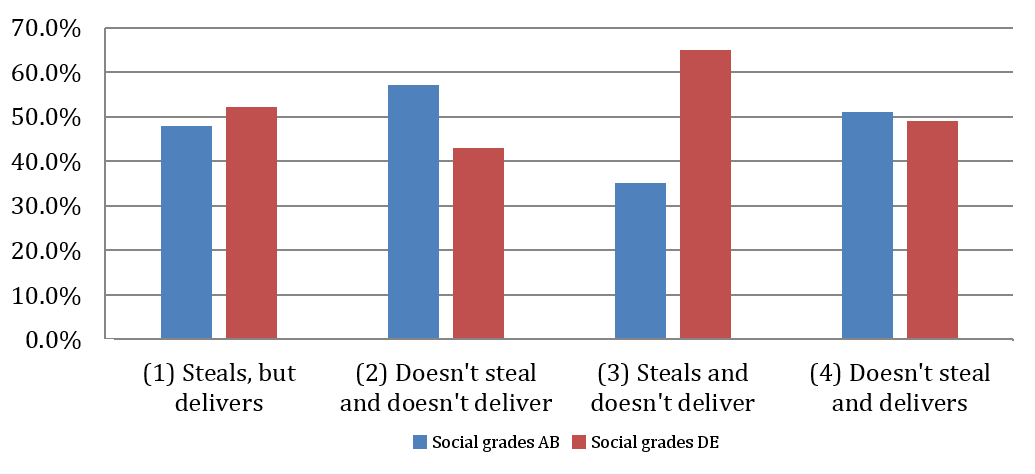 In Lima as elsewhere, system justification fulfils the social and psychological need to give legitimacy to the status quo, making the populace both victims and accidental supporters of corruption, writes Ana Vergara (LSE Psychological and Behavioural Science).
In Lima as elsewhere, system justification fulfils the social and psychological need to give legitimacy to the status quo, making the populace both victims and accidental supporters of corruption, writes Ana Vergara (LSE Psychological and Behavioural Science).
In today’s Peru the past three presidents and several local authorities are under investigation for allegedly receiving bribes to award contracts for major infrastructure projects to the Brazilian construction giant Odebrecht. It comes as no surprise that the country ranked 101st of the 176 nations surveyed for the latest Corruption Perceptions Index.
Prior to the last local elections in Lima, a 2014 poll asked, who do you think will “steal but deliver more public works” if elected mayor? 49.5% of the population said that it would be Luis Castañeda, who was running for a third term in office after a failed run for the presidency of Peru. He was later elected with 50.31% of the vote. In a country where doing public works tends to be associated with building infrastructure, and in turn to corruption, this ‘stealing-delivering’ trade-off is modulated by a mechanism known as system justification, which ameliorates cognitive dissonance and favours tolerance to corruption.
My own research has compared tolerance to corruption between the upper and lower classes in Lima, finding that there are no major differences in voting for a corrupt incumbent across social class. When presented with four different vignettes about a mayor who (1) steals, but delivers; (2) doesn’t steal and doesn’t deliver; (3) steals and doesn’t deliver; (4) doesn’t steal and delivers; there was no significant association between social class and the likelihood of voting for the incumbent up for re-election (figure 1, below).

Underlying this is a generalised view of rampant corruption and an effort to rationalise an initially unwanted outcome: a mayor who steals is made more desirable in line with the probability of this outcome. Both upper and lower class participants felt that “being honest is not enough”, even going as far as to “prefer somebody who stole and delivered” on the basis that all of them steal. As one participant fatalistically observed, “it’s like yin and yang”.
Such ideas are also reinforced by the visibility of things “being done” and “proving” the mayor’s capacity to deliver, because direct experience of the provision of public goods outweighs attitudes to allegations of corruption recognised only indirectly through secondary sources, not least the media.
Corruption is so ingrained in society that the fourth condition – doesn’t steal and delivers – is the one that created most suspicion, being described as a “fairy tale”, this candidate’s voters as “gullible”, and his/her possible re-election as a “chance for him to engage in bribery”. Where corruption is generally associated with the provision of public goods, giving a chance to potentially “clean” newcomers comes up against this barrier, favouring those considered to “steal but deliver”.
The extent of psychological dependence on the system is clear in this exchange between two lower-class participants:
- A) It doesn’t matter that they steal, but do something… they’d better do the works…
- B) Of course, it doesn’t matter, but we need to see changes…
- A) Because saying that they will not steal…
- B) That’s a lie, a lie…

Participants from both social classes considered it “very common” for politicians to take bribes. However, when asked if they themselves had voted for a corrupt politician – i.e. facing corruption charges – both groups answered “rarely” or “never”. This clearly shows that there is cognitive dissonance between experiences as voters and experiences of a society where all politicians are perceived as corrupt.
The need to maintain a positive moral self-concept clashes with potentially dishonest behaviour, forcing people to minimise this dissonance by making the status quo natural and inevitable, leading in turn to conformity. Even where there is acknowledgement of this process, it comes up against a need to rationalise the system, as demonstrated by these two upper-class participants:
- Acknowledgement: “We’ve reached a level of conformity that is frankly frightening, because it’s the same for elections. In the elections who do we vote for? The lesser evil. It’s sad, but it’s what we do … why does it have to be this way? In the end… [another participant giggles] It’s not funny!”
- Rationalisation: “… you can’t do anything, the whole system of government is involved; there is always corruption.”
The ultimate upshot is that “we are a resigned country”. System justification fulfils the social and psychological need to give legitimacy to the status quo, making the populace at once victims and supporters of the system.
Sadly, where people have no sense of control, they increasingly support external sources of power like the government, no matter how corrupt these may seem.
Notes:
• The views expressed here are of the authors rather than the Centre or the LSE
• Please read our Comments Policy before commenting






Great article! Lack of transparency and honesty is part of Peruvian society. Telling the truth is not something Peruvians are taught at home, it is acceptable to lie for even the most insignificant situations, the most important thing is that you justify your actions even when you are still lying! I am not surprised that most politicians and therefore governments are corrupt. It is time to change but it has to start from what you are taught at home. Thank you Ana for your excellent article
Nicely written. Your article describes the many faces involved in the political crisis peruvians are immersed nowadays. Their lack of serious involvement in their own political system has led them to the picture you have described, because as you have said here, complaining is basically all most of them do and on top of that, they don’t like to take responsibility for their choices.